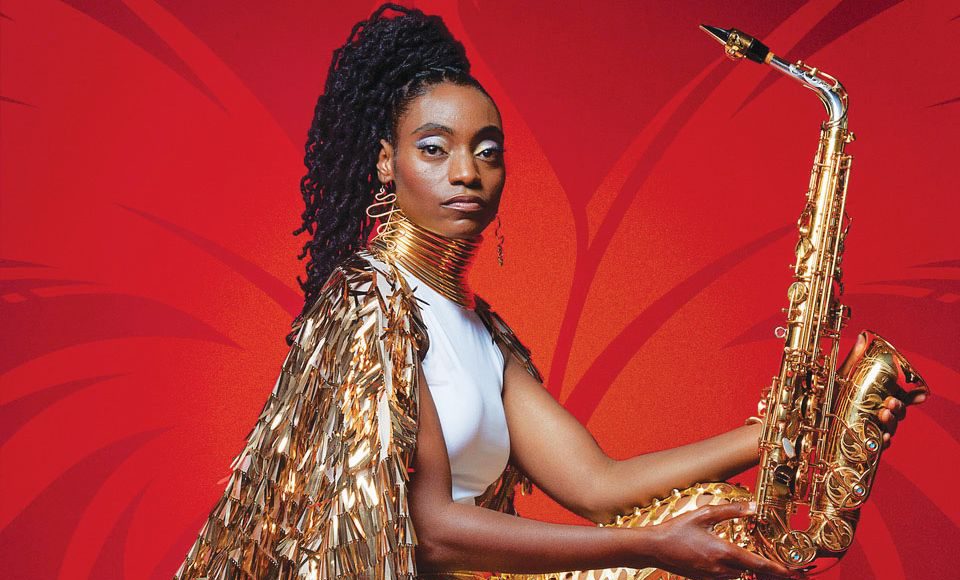Each time American jazz saxophonist, composer and bandleader Lakecia Benjamin lifts her instrument to her lips to perform, a riveting, musical marvel occurs.
The three-time Grammy-nominated artist’s dynamic sound, arrangements and original compositions consist of a masterful deep-stitch weave of jazz, R&B, funk and hip-hop that has swiftly propelled contemporary jazz into new territory. This is miraculous because just two years and four months ago while driving home alone from a festival performance, Benjamin ended up in a ditch.
“I learned I’m a fighter,” said Benjamin. “I believe in keep going and try to get to a higher place.”
The accident left her with three broken ribs, a fractured scapula, a perforated eardrum, concussion-induced neurological damage, and most notably, a broken jaw. “Just being out on the road and some jobs I did with a broken jaw, broken body parts…there was something about interacting with people in those vulnerable spaces,” she said.
Three weeks after the accident, Benjamin was in Europe performing tracks from Pursuance, her 2020 album devoted to the music of Alice and John Coltrane.
Benjamin’s most current album, 2023’s Phoenix, features a list of guest artists with resilience stories. “The majority of [the artists] had made their career from their own bones,” she said. “Some of them came from a low place of shame, came up to a high place, and some of them even came back down and then up again. I was looking for that same thing in myself.”
The album, composed during a one-year period, is arranged chronologically with the 12 tracks based on something that occurred in her life each month. The first track began “from the moment after her accident,” said Benjamin.
Despite a tumultuous time for events, Benjamin’s band stuck together during the pandemic’s long months of random shutdowns and chaos. “The band has evolved, my saxophone playing has grown, my ability to relate to the audience,” she said. “Even though there’s negativity everywhere, there are people supporting the music [and] come to a show to experience something together in a sacred space. When you lose something, like the audience-performer relationship during Covid, it’s more special when it comes back.”
Prior to the pandemic, Benjamin was a resident artist at the Lincoln Center while teaching middle school-age students. Benjamin found it most effective to encourage them to make a personal statement expressing who they are rather than strive first for technique. “With technical stuff, anyone grinding hours and hours a day can get it” she said, “but some people who never learn to express who they are never find their unique identity their whole lives.”
Benjamin suggests to discover oneself as a jazz musician comes from listening to both past and current artists. “Because there’s not saxophone playing on pop radio, I encourage [students] to listen to great sax players from the past,” she said, “but also to play along with pop music they like. You have to start in the foundation of the jazz culture, then find your way from that.”
Perhaps fighting her way back through astonishing pain to perform and tour after surviving a near-death experience, along with a firm belief in touching the hearts and souls of human beings with her music, makes Benjamin resist being pinned into a box when it comes to her future.
“Life evolves and changes,” she said. “The role of music is healing and musicians are charged with being healers, but in terms of my career, I don’t have it mapped out. I don’t try to force a next album or new thing. Waiting for a story to tell is what works for me.”
Phoenix, Benjamin emphasizes, is her story of resilience, power and having the strength to keep going when all odds are positioned in opposition. She still can’t explain how she was able to perform the John Coltrane repertoire so soon after her accident. “There’s no technical, superficial, philosophical or medical reason I was able to play. You’re not supposed to be able to play the saxophone with a broken jaw. You’re not supposed to even be able to grip your mouth to play. Maybe the music just lifted me up. There’s no other answer,” she said.
Her “100% hope” for each audience is that they are similarly lifted up. “Maybe they’ll walk away with inspiration, feeling and thinking they had a good time in a safe space where they were seen and understood,” said Benjamin. “The hope is that they walk away with something.”
101 Paseo de San Antonio, San Jose
Jan. 26, 7pm, $20–$45
Lakecia Benjamin and Pursuance
The Studio at Bing Concert Hall
327 Lasuen Street, Stanford
Jan. 27, 7pm, $40-$50




This is going to be excellent!